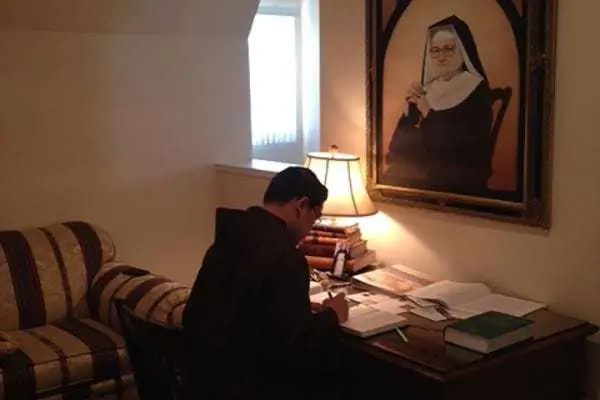“The Christian vocation is simple: You are first a child of God, and the state of life where God has placed you is the source of your holiness.”
— Mother Mary Angelica, P.C.P.A.

“I will sing aloud of Thy steadfast love in the morning.” Ps. 59:16
“I conjure you all to show all reverence and all honor possible to the most holy Body and Blood of our Lord Jesus Christ, in whom the things that are in Heaven and the things that are on earth are pacified and reconciled to Almighty God.” — St. Francis of Assisi.
“Let the entire man be seized with fear; let the whole world tremble; let Heaven exult when Christ, the Son of the Living God, is on the altar in the hands of the priest. O admirable height and stupendous condescension! O humble sublimity! O sublime humility! That the Lord of the universe, God and the Son of God, so humbles Himself that for our salvation He hides Himself under a morsel of bread. Consider, brothers, the humility of God and pour out your hearts before Him, and be ye humbled that ye may be exalted by Him. Do not, therefore, keep back anything for yourselves that He may receive you entirely who gives Himself up entirely to you.” — St. Francis of Assisi
“His mother said to the servants, ‘Do whatever He tells you.’” John 2:5
“In daily events, I must see the Providence of God. Remember this one little truth: Nothing happens to you without the stamp of His Providence placed upon it before it happens. That’s faith.” — Mother Mary Angelica, P.C.P.A.
“The Spirit speaks many languages, but perhaps the most important is the language of silence. You want to try speaking to God that way sometimes. Quiet your mind, stop thinking about what you must say and be still. Do nothing but realize for a few moments the essence of God. This language of contemplative silence can utterly annihilate you and sensitize you to the Presence of the Lord. When the soul and spirit prostrate themselves before God, realizing their own nothingness, many words are heard, but not spoken.” — Mother Mary Angelica, P.C.P.A.
“From the rising of the sun to its setting, the name of the Lord is to be praised!” Ps. 113:3
“We use the talents we possess to the best of our ability and leave the results to God. We are at peace in the knowledge that He is pleased with our efforts and that His Providence will take care of the fruit of those efforts.” — Mother Mary Angelica, P.C.P.A.
“Holiness is a beautiful struggle.” — Mother Mary Angelica, P.C.P.A.
“To be able to say yes to God at every moment of our lives is the essence of holiness. It really doesn’t matter whether you are at prayer, whether you are working, whether you’re recreating, whether you’re eating or sleeping—nothing should separate you from Jesus.” — Mother Mary Angelica, P.C.P.A.
“Silence is not something that you can impose from the outside in. It’s something that’s inside, and it must grow and be concentrated. Without it you cannot achieve holiness, because you cannot hear God, and neither can you speak to Him.” — Mother Mary Angelica, P.C.P.A.
“Before you go to bed, examine your conscience a little bit and ask yourself if you were like Jesus today.” — Mother Mary Angelica, P.C.P.A.
“We are all called to be great saints. Don’t miss the opportunity!” — Mother Mary Angelica, P.C.P.A.